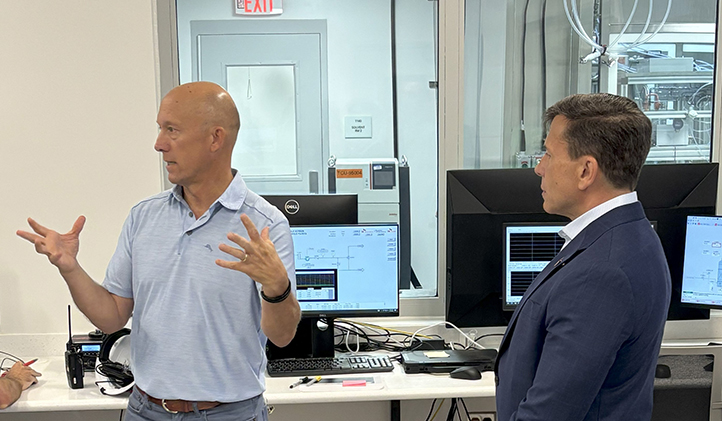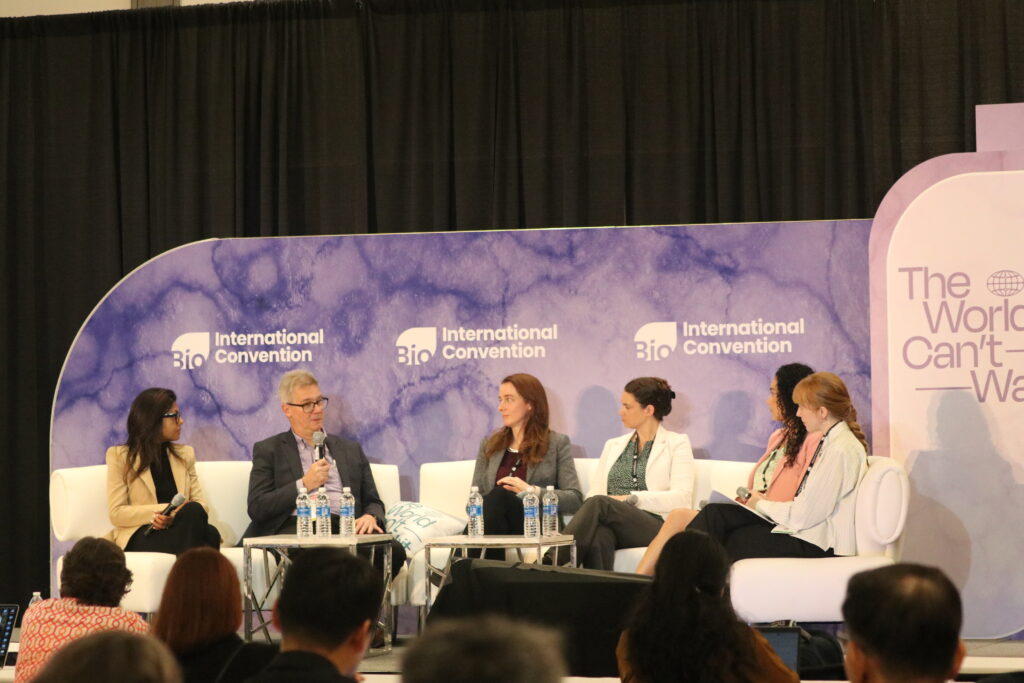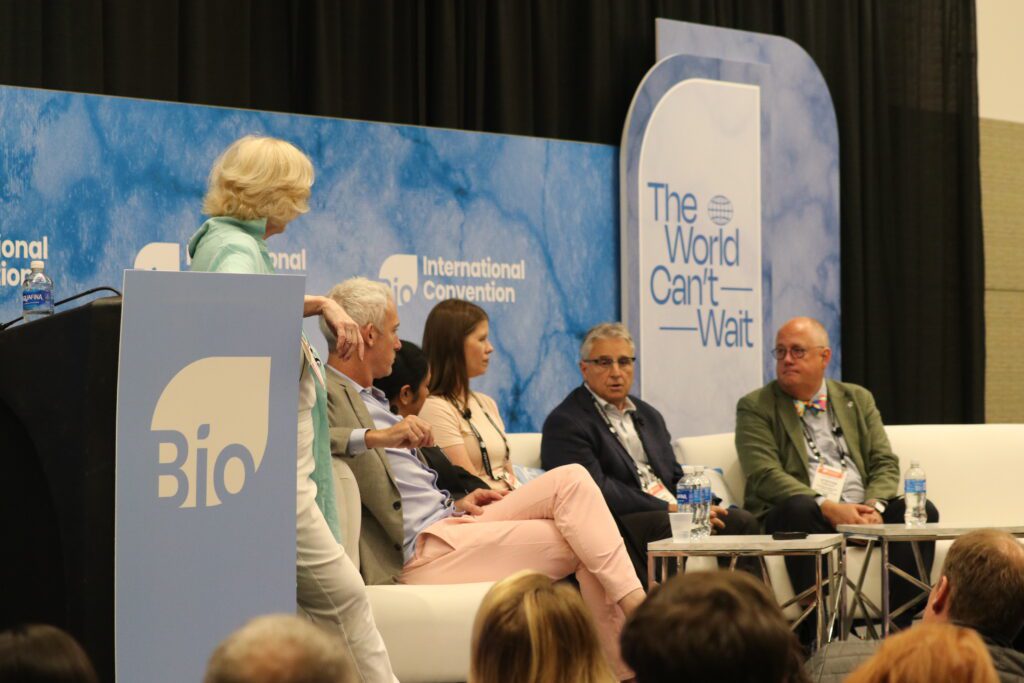With more than $1 billion in R&D expenditures in 2022 and 415 new patents in 2023, the bioscience sector in Virginia is making an important contribution to America’s standing as the world’s leader in biotechnology.
Participants in the state’s diverse biotech ecosystem explained their achievements, goals, and needs when the Biotechnology Innovation Organization (BIO) visited the capital of Richmond on July 16 and 17 for listening and learning sessions.
BIO President and CEO John F. Crowley led this latest stop of BIO on the American Road, a series of visits to biotech centers around the country. The BIO team met local biotech business leaders and patient groups, and toured a unique facility that is strengthening America’s pharmaceutical supply chain and biotech independence.
Richmond is one of five biotech hubs in the state, with the others being Northern Virginia, Coastal Virginia, Charlottesville, and Roanoke-Blacksburg, said John Newby, CEO of Virginia Bio and a proud host.
“When it comes to locating a biotech business, there’s some pretty significant strengths here in Virginia,” Newby said. Along with its concentration of biotech research and industry, “Virginia is also known to be a very business friendly state in general,” rated the fourth-best nationwide in the CNBC rankings that just came out July 15, he said.
Virginia’s nearly 3,500 bioscience businesses employed more than 30,000 people, the latest TEConomy/BIO report showed. Virginia works hard to support that industry: Gov. Glenn Youngkin, BIO’s Governor of the Year in 2024, allocated $90 million for Virginia’s Research Triangle, focused on biotech.
‘Securing America’s pharmaceutical sovereignty’
Virginia’s biotech growth and leadership was on display during the tour’s site visit to the Petersburg, Va. Phlow facility, which receives U.S. Biomedical Advanced Research and Development Authority (BARDA) funding as part of an effort to safeguard America’s medicine cabinet.
Phlow is purpose-built to manufacture industrial quantities of small-molecule active pharmaceutical ingredients (APIs), a type of production that U.S. companies began outsourcing decades ago. Currently, the APIs required for most American drug manufacturing are produced in India or China, creating a strategic weakness in our medical supply chain.
“Phlow is a mission-driven organization with a public benefit mandate, guided by long-term partnerships with both government and private industry,” said Chris Rogers, Phlow Chief Commercial Officer. “By offering domestic capacity for APIs, Phlow demonstrates how each of us can play a role in securing America’s pharmaceutical sovereignty.”
The new facility is also demonstrating leadership through the use of the latest science in production. “By integrating artificial intelligence with advanced manufacturing technologies, we’re accelerating production timelines, optimizing quality, and enabling faster scale-up for new products,” Rogers said.
Crowley noted the importance of bringing drug manufacturing back to the U.S., and praised the industry’s and Virginia’s involvement in the effort.
“Just as all politics is local, biotech is local too,” he said.
What local biotech needs
Back in Richmond at a listening session with leaders from local businesses and research institutes, Crowley asked two key questions: “Why Virginia?” and “What do you need to succeed?”
Newby of Virginia Bio gave several reasons for choosing Virginia, including its low barriers to entry and an excellent education system providing a highly capable workforce.
Others agreed that, as the biotech ecosystem grows in the state, the availability of trained workers was improving. Still, they saw a need for more investment in the human capital pipeline, and noted that neighboring Maryland is competitive in this area.
Along with human capital, there was a recognition of the need for venture capital. “One of the challenges in Virginia, and indeed most all states in the past year and a half, has been capital,” Newby said.
“Richmond is a start-up environment,” and the small biotechs in that environment need seed funding, added Srirama Rao, Vice President for Research and Innovation, at Virginia Commonwealth University.
“Hopefully this visit by John and the BIO team will let the world know the great things that are happening in Virginia and help attract the capital we need,” Newby said.
Patient groups
As always, Crowley sought to ensure that patients remain at the center of the conversation. He joined patient groups for a listening lunch.
One of the groups represented, Rx Partnership, works with pharmaceutical companies and free clinics in Virginia to help provide access to medicines for uninsured and underinsured patients.
Amy Yarcich, Executive Director of Rx Partnership, explained that she began working for the organization after needing help for treating her son’s rare chromosome condition, despite being insured. Her son’s doctor explained how pharmaceutical manufacturers support those in need through patient assistance programs.
“I hadn’t realized these programs existed, but then I called the number and gave some information about our income and our details, and the next day they’re shipping out what would cost thousands of dollars, in vials of this growth hormone, my son needed,” she said. “It really made a huge difference.”
Yacich observed that her experience was similar to many of the other patient advocates who met with Crowley in Virginia.
“You know, the folks at lunch—myself included—have had challenges with medication access and kind of personal stories. A lot of the work I do day-to-day for my organization is because I recognize how difficult it is to do what’s needed for my son.”
Wrapping up the trip at an evening reception, Crowley told his own story of getting involved in biotech when he learned of two of his children’s diagnoses with the rare condition called Pompe disease. He explained how he helped to found a company that eventually produced a treatment for Pompe, and he urged the attendees to continue their important work of striving to provide patients with the treatments and care they need.




